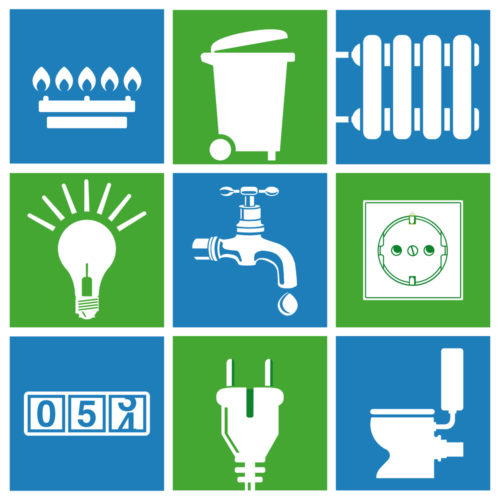Electricity and water are essential to keeping your life going. They’re normally a top priority, but what happens when you can’t squeeze them into your budget? This is especially difficult considering that many utility companies don’t accept credit cards.
If you are experiencing a financial emergency, preparing to face job-loss, or dealing with other financial hardships such as those from the coronavirus, you need to know what to expect and what to do if you can’t pay your utility bill.
This article will discuss what can happen and will provide insight on a few options that might be available to you if you can’t make your utility payments.
Table of Contents
Can Utilities Shut Off My Service?
Utility providers can shut off services for non-payment. In general, a utility company is able to shut off services as long as they have provided a warning. If your services have been terminated for non-payment, you may be required to pay a termination fee or provide a deposit in addition to paying off your debt to restore your services.
How Long Before They Shut Off Electricity?
You typically have a couple of months to miss payments before the utility company will turn off your electricity. The power company will send you a written notice, usually a week before they intend to shut off the electricity.
Furthermore, they’ll probably have to contact you the day of, or at least make an attempt to. However, if you rely on electricity for heating there are special regulations in place to keep it running during the winter months.
How Long Before They Shut Off Water?
Typically, after a few months of missed payments, the water utility will contact you with a warning. They will give you at least a week’s notice before they shut off your service. If you want to know whether your water is about to be shut off, pay attention to your mail. Your provider is required to deliver a written warning. They may also call you to alert you that your water will be shut off.
Rights and Protections From Disconnection
There are special regulations, moratoriums, and exceptions that protect some individuals from disconnection. Protections against shut-offs and terminations range by state but may include:
- Serious illness, disability, injury, or personal safety: If a member of the household is seriously ill or lives with a disability, your health practitioner can send a letter to your utility company and you may have to fill out a financial hardship form.
- Families with infants: If a family has an infant or a child under one year of age you can fill out a financial hardship form and may be asked to include a birth certificate to prove the age of your child.
- Elderly households: Households in which all adult-aged inhabitants are 65 years and older may have protections from utility shut-offs.
- Let your utility provider know that all adults in the home are 65 and older and fill out a third-party contact form. The third party is not legally responsible for paying the bill, but the provider will have to notify the third party of any shut-off notices.
Can Your Utilities Be Shut Off in Winter?
Consumer protection laws and regulations for utility disconnection differ from state to state. In general, it is often illegal for a utility company to disconnect service under certain weather conditions, or during a specific time frame — such as the winter months. It is important to know your state protection and disconnection laws if you fear that your utilities may be shut off in the winter months.
COVID-19 Utility Protections
If you are experiencing financial hardship from the impact of coronavirus, you may seek federal assistance or assistance from your own utility company through the CARES Act.
Some states have suspended disconnections for everyone, while others are only suspending disconnections for low-income and senior households. COVID-19 disconnection suspensions are state-regulated and may change often, so it is important to keep up to date with changes for your state and utility.
How to Prevent a Water or Electricity Utility Shut Off
If you have unpaid utility bills or fear that you will not be able to make your utility payments, there are a few options to consider. Failing to pay your utility bills may not only cause your services to be discontinued, but missed payments may also appear on your VantageScore credit report, which could be damaging to your credit score.
The debt accrued from missed payments may be sent to a debt collections agency, which could further affect your credit score and your future financial health. If your unpaid utility bills have already gone to collections, you should contact your state regulatory commission and ask about your consumer rights.
Contact the Utility Company
The first thing to do if you have missed payments or fear that you cannot make your usual monthly bill is to contact the utility company directly. You will need your latest statement that includes your account number, as well as the debt that you owe. You should inquire about:
- Any additional fees that may not be included on your current statement.
- If the utility has a hold program.
- If the utility has a discount program.
- If the utility has a program that averages bills throughout the year.
- If you can get an extension for your bill.
You should be sure to record the day and time of your call, as well as any information that the utility provider offers you. This information can be extremely helpful if something goes awry in the process, or if you need to pursue legal action later on.
Ask for a Payment Plan
A utility company will be willing to create a payment plan for you to pay your utility debt back over time. A payment plan may add a small amount of your debt to your monthly bill, rather than paying the debt in a total lump sum.
Some utility companies also offer programs that average your utility bills throughout the year. To manage both/either of these options you will need to create a budget or use a budgeting app to stay on track with your monthly bills and to maintain your financial health in the future.
Lower Utility Bills
There are a few options to lower your utility bills.
- You may be able to apply for a grant or financial assistance from the U.S. Department of Health and Human Services Low Income Home Energy Assistance Program (LIHEAP). Eligibility varies by state, so you will need to ensure that you meet the requirements. You can do so by contacting your local LIHEAP administrative office.
- Some states offer specific housing and public utility resources that provide financial assistance for your monthly utility bills if you qualify.
- Your utility provider may offer a program that averages your utility bills for the whole year. This doesn’t necessarily mean that you will lower your overall payments, but your larger payments will be averaged among the smaller ones, making your bills more manageable month to month.
- You may also be able to lower your monthly bills through energy conservation. Some utility companies offer energy conservation assistance programs that may include a free evaluation of your home with tips or tools to conserve.
- You may also choose to adopt more eco-friendly habits and a green lifestyle that lowers your bills and your carbon footprint with simple actions, such as turning off the lights or other electronics when not in use.
Social Resources for Utility Assistance
There are some charities, churches, or community organizations that can provide financial assistance for those facing hardship or a bill-paying crisis. You can learn more by dialing 211 for essential community services in your area, or by calling local churches in your area and asking about financial assistance for utility bills.
Other organizations that can offer financial assistance for utility bills may include:
- The American Red Cross.
- The Salvation Army.
- Catholic Charities USA.
- Love INC National.
- Lutheran Services in America.
- The National Council of the United States, Society of St. Vincent de Paul.
- The Jewish Federations of North America.
- The National Urban League.
Declaring Bankruptcy to Prevent a Utility Shut Off
If you are severely behind on your payments or are behind on multiple debts, you may consider filing for bankruptcy. Filing Chapter 7 bankruptcy may provide a temporary stop to a utility shut-off, as the utility company will not be able to disconnect your services during the bankruptcy process.
However, filing for bankruptcy is not a permanent solution. After your bankruptcy case concludes, you may be required to put a deposit down for utility services in the future. Filing for bankruptcy can severely damage your credit and will require lengthy credit repair actions. So, you should consider all other options to pay your utility bills and debt before choosing to file bankruptcy.
Image Source: https://depositphotos.com/





